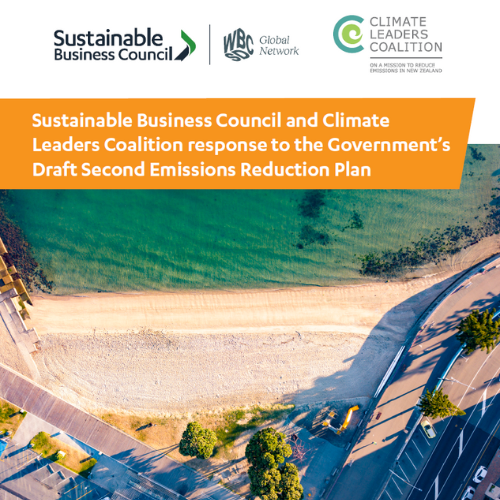The Sustainable Business Council (SBC) and Climate Leaders Coalition (CLC) are calling on the Government, and opposition MPs, to work together with business to help secure the investment needed for a low-emissions, climate resilient economy.
SBC members and CLC signatories represent more than 160 New Zealand businesses, who contribute more than 40 percent of the country’s GDP. Jointly, the network of business leaders has responded to the Government’s Draft Second Emissions Reduction Plan (ERP2).
“Long-term policy stability will deliver significant private capital flows,” said Executive Director of the Sustainable Business Council, Mike Burrell.
“Alignment on key climate policies across finance, agriculture, nature, energy and transport – as was achieved with the Zero Carbon Act, and now climate adaptation – will pay dividends.
“There will be eight elections between now and 2050. Taking this approach will put us in the best position to meet our climate commitments, avoid significant financial liabilities, and keep pace with our key trading partners.”
In responding to ERP2, the joint submission sets out a range of additional recommendations, including:
- Creating a regulatory framework that will enable the growth of private sector-deployed initiatives which use nature-based solutions to address climate change.
- Adapting the concept of ‘least cost’ to one of highest future-value, taking a longer term and broader view of the opportunities presented by the transition.
- Adopting a dual consideration of net and gross-based emissions.
- Implementing a broader range of policy mechanisms to address the risk of under-delivery of emissions budgets.
“We welcome the Climate Change Minister’s invitation in the document to contribute to the policy and partnerships required,” said Burrell.
CLC Convenor and Genesis Chief Executive, Malcolm Johns, says businesses acknowledge that the path is not always linear.
“Most of the priorities raised are policy options to set the context for private sector action – though Government is key to creating that enabling environment. The ERP should recognise the roles of different actors as well as provide confidence on direction,” said Johns.
The combined emissions reduction achieved by current CLC signatories between signing up to the Coalition and November 2023 is 3.6 million tCO2e, a cumulative 29% reduction achieved during their membership period.
A copy SBC/CLC’s full joint submission can be found here.

